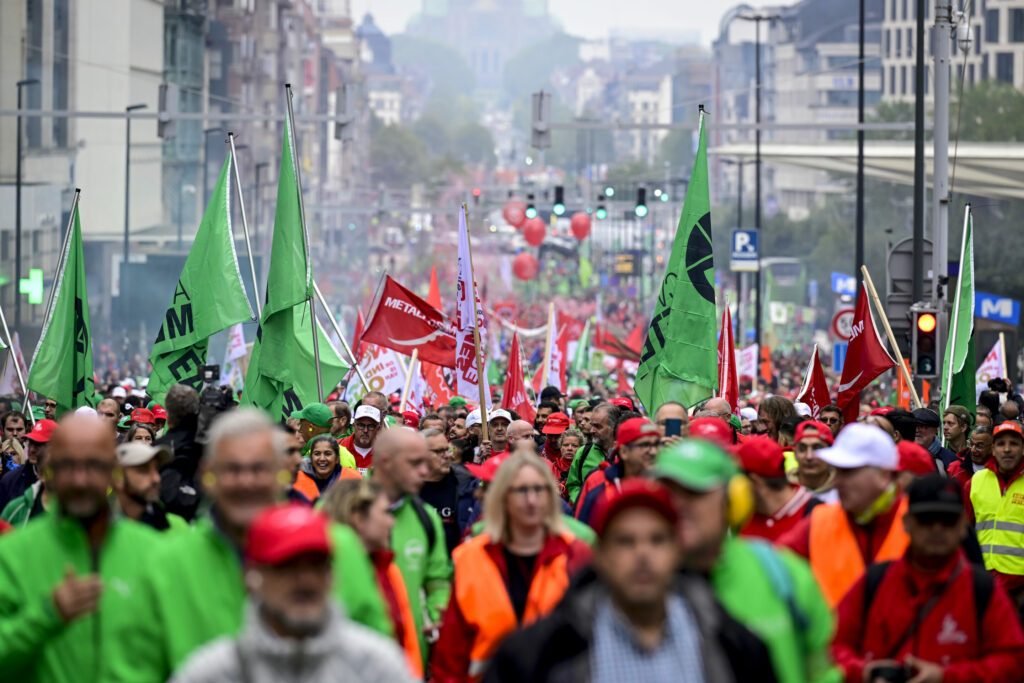Estimates vary as to how many thousands of people took to the streets of Brussels on Monday but there was no ignoring the thunder of firecrackers and whistles making its way through the city in solidarity with the staff of Audi Brussels and Belgium's struggling industries.
Workers from the Audi plant were centre stage in a march from Gare du Nord to Place du Luxembourg on Monday morning. The demonstration comes in the context of an ongoing conflict over the potential closure of the factory in Forest (although management and unions have agreed to temporarily resume production today).
But Monday's mobilisation grew into a warning cry about the future of industry across Belgium and Europe – with delegations travelling from Germany, Italy, Poland, France, the Netherlands, Czech Republic, Bosnia-Herzegovina and Hungary.
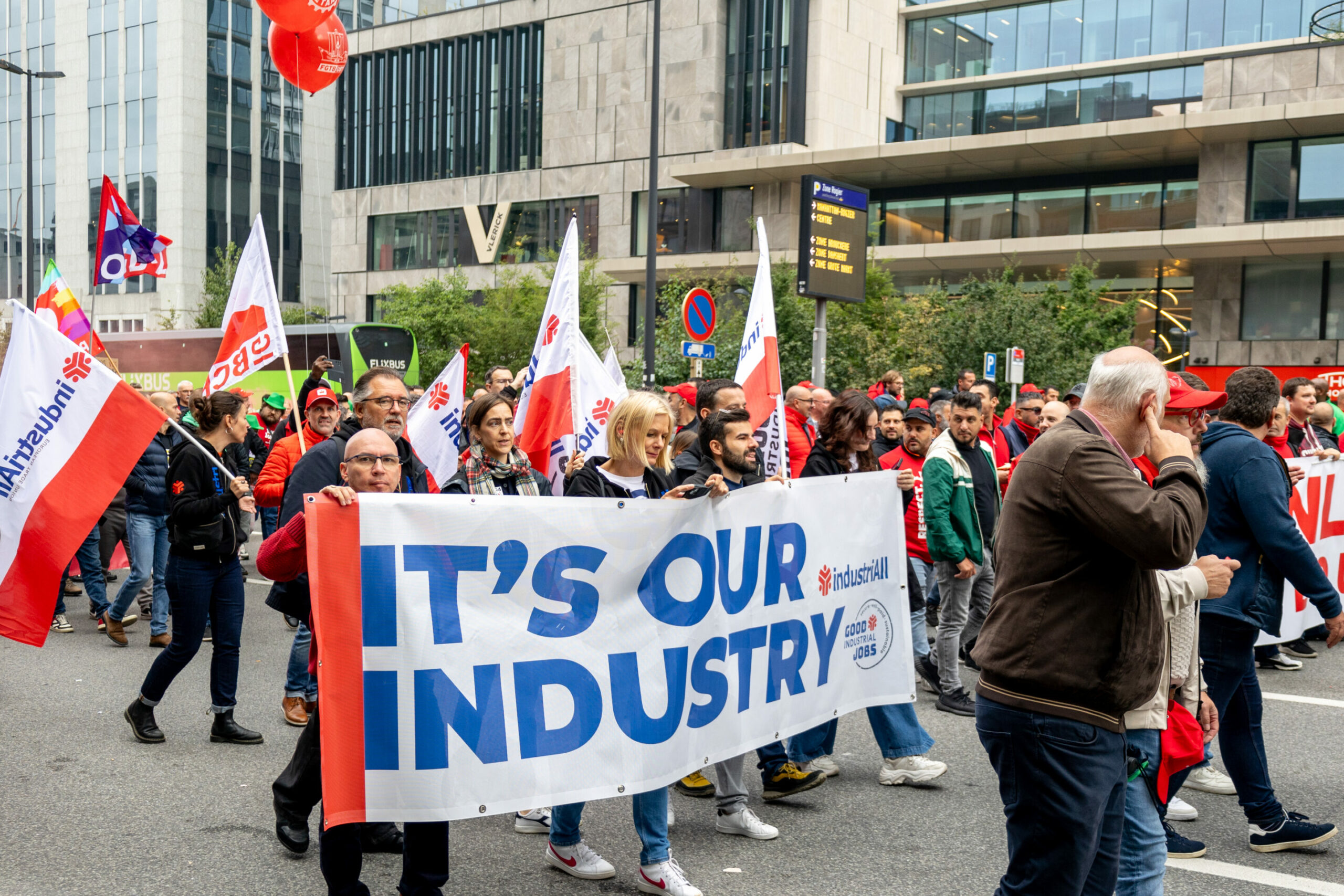
Protesters pictured during a demonstration by Audi Brussels workers supported by the national trade union in solidarity, on Monday 16 September 2024 in Brussels. Credit: Belga / Ward Vandael
Belgian police estimate that around 5,500 people turned up in protest while unions put the number at over 10,000. Energy was high as participants gathered at Gare du Nord before 10:00. Chants were punctuated by firecrackers and some attendees were already drinking beers.
Eating away at Belgium's social benefits
Amid the throng of union workers, metal worker Eddie told the Brussels Times that he travelled from Andenne in Wallonia to show solidarity.
"We came to support Audi Brussels because politicians do nothing. Soon there won't be anything left in Belgium. A big factory like this closes, maybe ours will close later," he said, speaking about the foundry in Ardennes where he works.
"We're letting all the factories go elsewhere. OK, we [Belgian workers] may be a little more expensive, but we work well. If the Belgians don't work any more, what are we going to do?"
Fellow worker Alain has also come to Brussels for the occasion. He says that a company with 220 workers has just closed down in his home region. "It's happening all over the country. The [incoming] government is calling into question all the social benefits we have here in Belgium: pension payments, reduced working hours for people aged over 55, the wage index... This government wants to do away with all that, and that's why people are demonstrating."
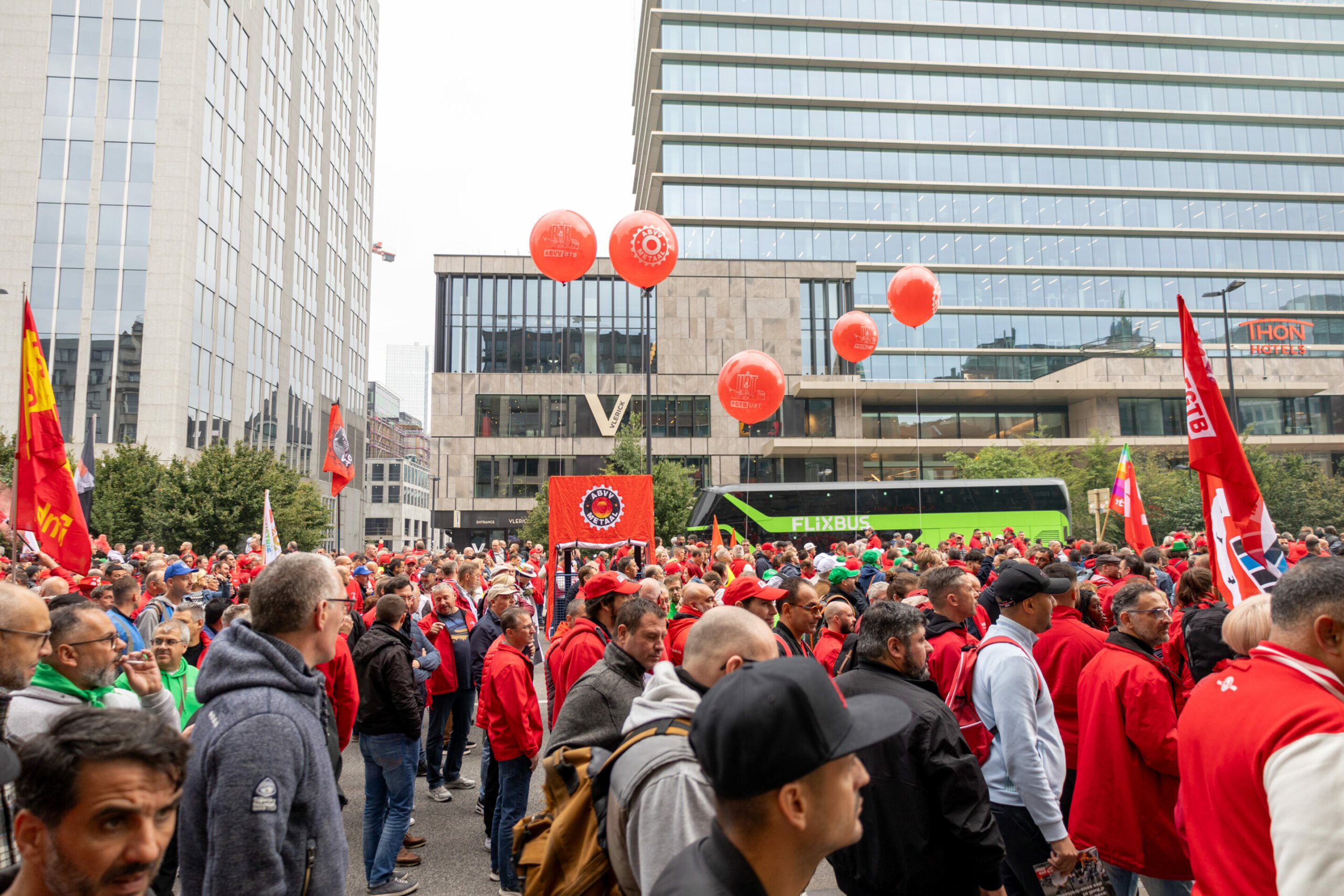
Protesters pictured during a demonstration by Audi Brussels workers supported by the national trade union in solidarity, on Monday 16 September 2024 in Brussels. Credit: Belga / Ward Vandael
'Hell for families that lose their livelihoods'
Rallying the crowd before they set off to the doorstep of the European Parliament, Secretary General of the MWB-FGTB Hillal Sor said Monday's march was a signal to both Belgian and European politicians.
"When a factory closes, thousands of direct and indirect jobs are threatened. It's a descent into hell for families who lose their livelihoods. We are not numbers on a balance sheet, but producers of wealth with skills and ambitions for our future," he said.
"It's time to take our hands out of our pockets. It's time to realise what's going on. This cry is being raised by workers all over Europe," he added, calling for investment to "reinvent" industry and develop sustainable technologies and environmentally-friendly production methods.
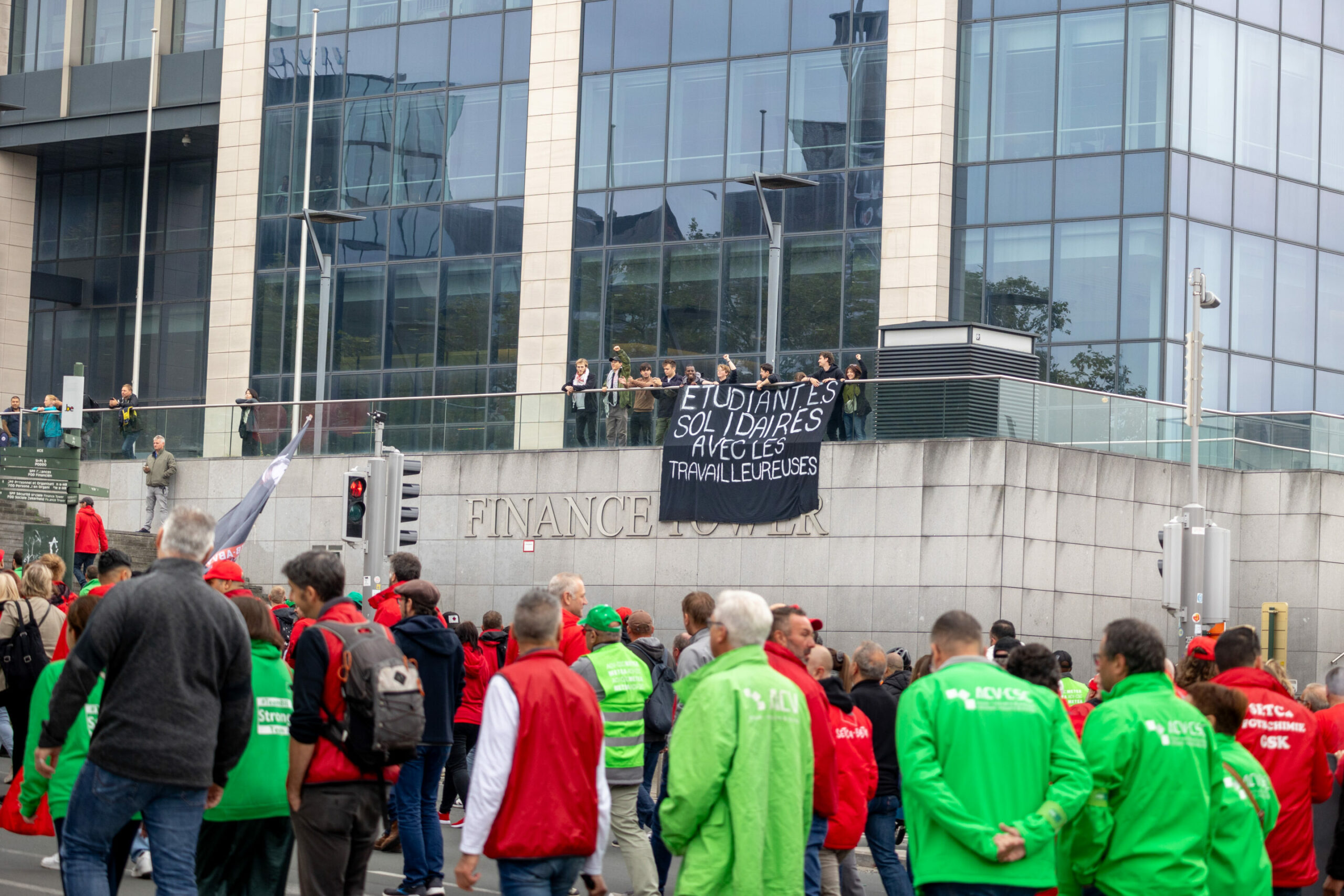
Students supporting workers at the demonstration on Monday. Credit: Belga / Ward Vandael
Audi is just the start
A sea of demonstrators filled the length of Boulevard du Jardin Botanique as they made their way towards Place du Luxembourg, with flares leaving plumes of red and green smoke in their wake.
Waiting for the procession to arrive in the square, ABVV/BBTK trade union secretary Olivier Van Camp told The Brussels Times that what is happening with Audi Brussels is indicative of a wider threat to European industry.
"We are demonstrating against what is happening now in Europe. We are under threat at the moment and that is why we are here today, not only for Audi but for other pieces of industry," he said.
Also waiting for speeches to begin in front of the European Parliament's home at Espace Léopold, factory worker Philippe said that for many there is a real concern that what is happening at Audi Brussels could happen at their own workplace next.
"I work in a factory where we make everything for railways, like wheels and wheelsets. We're here in solidarity today because everyone is affected. What is happening to Audi today could happen to us tomorrow," he said.
When asked how the Belgian government could protect industry in Belgium, Philippe said there should be stronger obligations for private companies to stay in Belgium after they receive State supports. "It's a shame that when the government provides funding to companies, the companies have no obligation in return. That's no good."
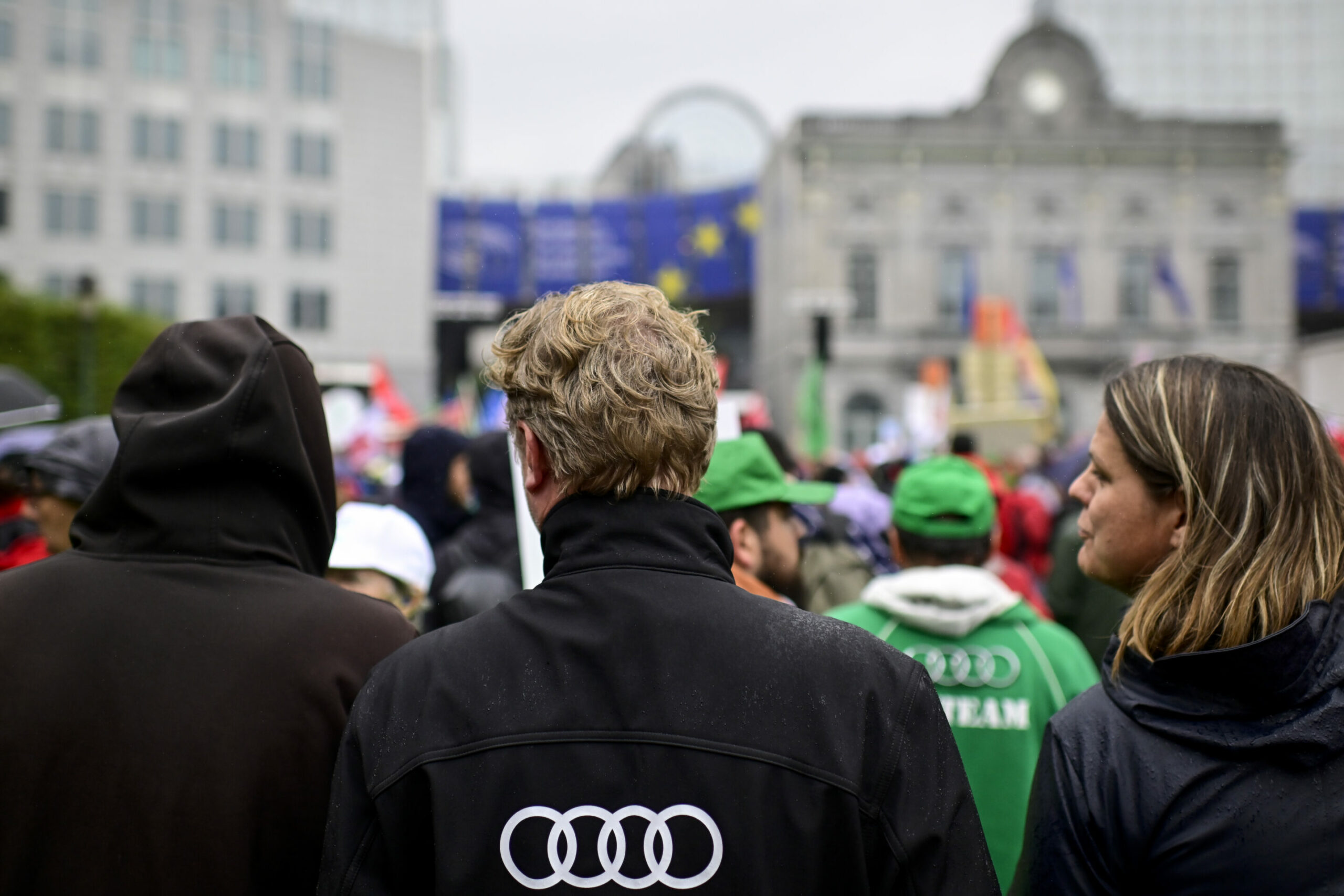
Protesters pictured during a demonstration by Audi Brussels workers supported by the national trade union in solidarity, on Monday 16 September 2024 in Brussels. Credit: Belga / Dirk Waem
Unions call for 'massive' industrial investment
Addressing the crowd gathered at Place du Luxembourg, FGTB President Thierry Bodson called for a "massive investment" in Belgian industry. But with the caveat that this shouldn't mean a "blank cheque to business".
"We don't need a return to European fiscal austerity. What we need is massive investment in industry. But that doesn't mean a blank cheque to business, investment and aid must always be strictly conditional. They are not gifts," he said.
Speaking on behalf of pan-European trade union group industriAll Europe, general secretary Judith Kirton-Darling said that politicians across Europe "don't recognise the scale of the crisis that we are in".
"We need an industrial plan and the accompanying investment. But we're not just going to give money to companies. We've seen the profits they've made over the last few years and we need strong social conditions to keep jobs, to maintain working conditions and ensure collective bargaining. We can't let companies privatise the profit and socialise the cost when the bad weather comes," she said.
"We have to be at the table, deciding the industrial plan for Europe. Our place is at the table, not on the menu," she added.
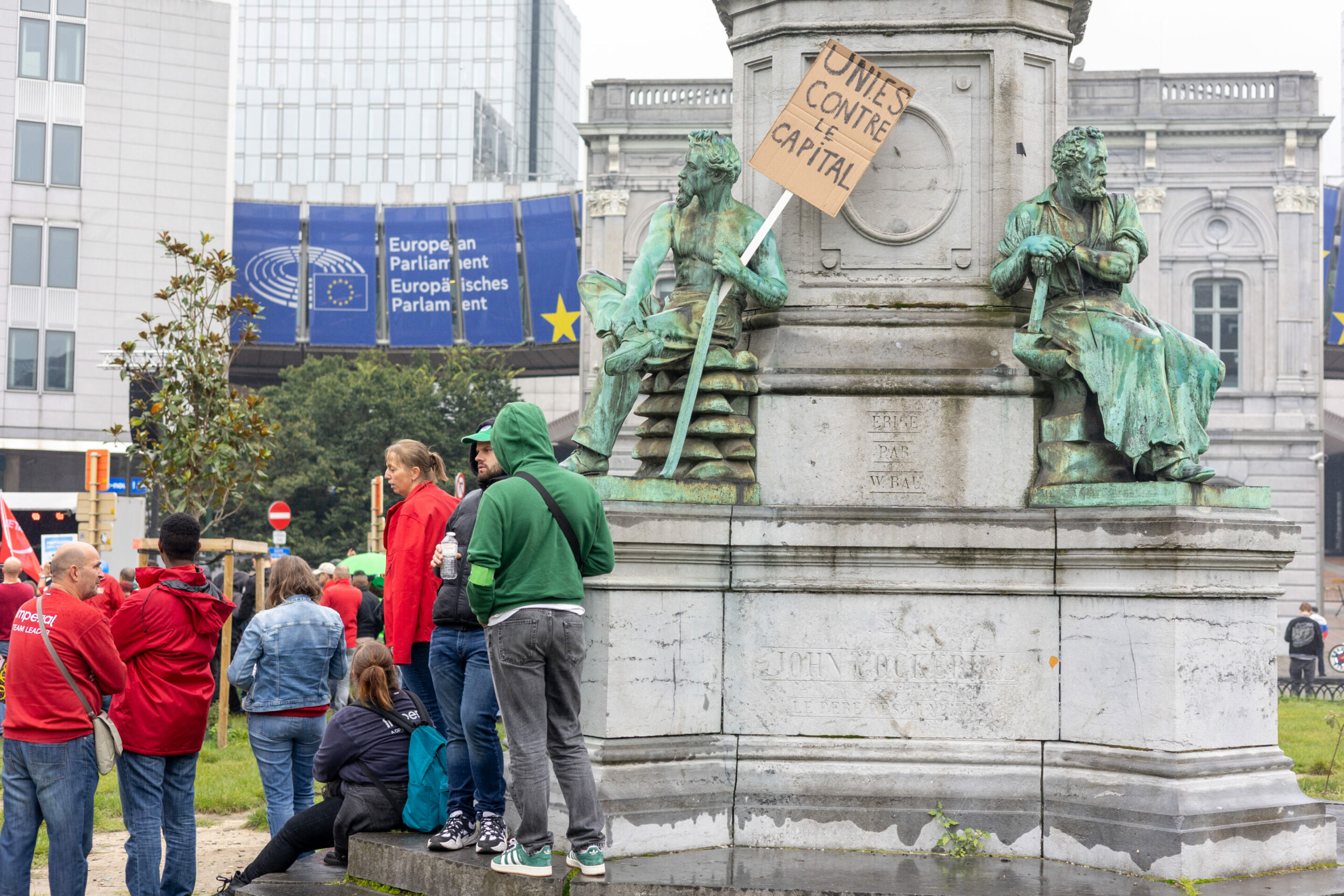
Protestors pictured during a demonstration by Audi Brussels workers supported by the national trade union in solidarity, on Monday 16 September 2024 in Brussels. Credit: Belga / Ward Vandael
Remembering Audi subcontractors
Any social plan negotiated for the staff of Audi Brussels should also be extended to subcontractors who work there, said Marie-Hélène Ska, secretary general of CSC.
"We need a social plan that covers all Audi workers, temporary staff and subcontractors. Every worker deserves to be respected for what he or she has contributed to the production of these car models," she said.
Ska said that Belgium's Renualt Law (which mandates a consultation period before any mass redundancies) needs to be amended to include subcontractors, as well as allow workers to have a "say in the strategic choices that are made" in companies during restructuring, rather than waiting for a closure announcement.

